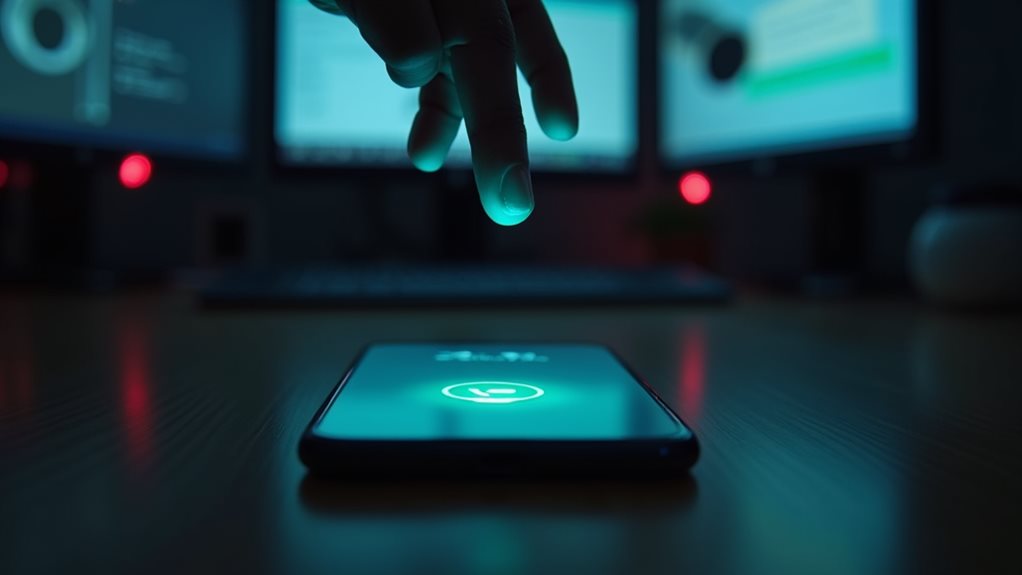While you can't directly trace the content of WhatsApp calls due to end-to-end encryption, certain aspects can be monitored through legal channels. WhatsApp collects metadata, including call duration, timestamps, and connection details, which law enforcement can access with proper warrants. Parents can use authorized monitoring apps like Bark or mSpy to track their children's WhatsApp activities. However, WhatsApp's sophisticated encryption and relay system make unauthorized tracing extremely difficult. The platform's security features protect your privacy while allowing legitimate oversight when legally required. Understanding these nuances will help you navigate the balance between privacy and security.
Understanding WhatsApp Call Security
WhatsApp calls come equipped with robust security features designed to protect your privacy during voice and video communications. Through advanced call routing technology, your conversations are safeguarded against potential privacy breaches, ensuring that your communication remains secure and confidential.
One of the platform's key privacy features is the "Protect IP Address in Calls" function, which works by masking your location through WhatsApp's server network. While this might slightly impact your call quality, it's a worthwhile trade-off for enhanced user privacy and security. This feature was officially released on November 8, 2023. The platform has implemented a new mitigation process that protects users from cyber attacks through audio calls, even when calls are not answered.
You'll appreciate knowing that even when your calls are relayed through WhatsApp servers, they maintain end-to-end encryption, keeping your conversations private.
The platform also offers the "Silence Unknown Callers" feature, which serves as an additional layer of protection. This sophisticated system uses privacy tokens to evaluate incoming calls, effectively reducing your exposure to potential cyber threats and unwanted communications.
End-to-End Encryption Technology
When you make a WhatsApp call, your conversation gets protected through end-to-end encryption, which creates unique cryptographic keys between your device and the recipient's device.
Your call's content becomes scrambled during transmission, making it impossible for anyone, including WhatsApp's servers, to access or understand the information being exchanged. Each call utilizes the Signal Protocol for robust security. Regular updates are implemented to address any security vulnerabilities and maintain strong protection. Additionally, utilizing encryption protocols enhances privacy by securing data against potential threats during transmission.
Through this sophisticated key exchange system, you'll maintain complete privacy of your call content, as only your device and your recipient's device possess the necessary keys to unscramble the encrypted data.
Understanding Encryption Key Exchange
Through an intricate system of cryptographic keys, end-to-end encryption safeguards your WhatsApp calls from unauthorized access. When you install WhatsApp, your device automatically generates two essential keys: a public key that's shared with others and a private key that stays securely on your device. This key distribution system forms the foundation of WhatsApp's robust encryption methods.
Your experience with this security system is seamless because everything happens behind the scenes. When you initiate a conversation or call, your device silently exchanges public keys with the recipient's device through WhatsApp's servers. The process uses an advanced protocol called X3DH handshake to establish a secure connection. Third-party monitoring of these encrypted calls is generally unfeasible due to the sophisticated security measures in place. With over 3 billion users relying on the platform, this security system proves crucial for protecting global communications. Additionally, strong encryption protocols help safeguard sensitive voice data during transmission, enhancing the overall security of your communications.
You'll never need to manage these keys manually – they're working hard to protect your privacy without any effort on your part.
Each message and call uses unique encryption derived from the previous key through a double ratchet algorithm. This means that even if someone were to intercept your communication, they'd only see encrypted data that's impossible to decipher without the recipient's private key.
You're part of a secure network where only intended participants can access the conversation.
Privacy Through Data Scrambling
Inside your WhatsApp calls, data scrambling transforms your voice into an unreadable code that only you and your recipient can decode. This advanced encryption process guarantees your conversations remain private, protected by the same security technology trusted by billions of users worldwide.
When you make a call, here's how data scrambling safeguards your privacy:
- Your voice data gets encrypted on your device using your recipient's public key
- The scrambled data travels through WhatsApp's servers without being decoded
- Only your recipient's device can unscramble the data using their private key
The privacy implications of this technology are significant, as it prevents anyone – including WhatsApp itself – from accessing your conversations. Similar to other popular platforms like Signal and iMessage, WhatsApp employs public/private key pairs to ensure message security. Additionally, WhatsApp employs end-to-end encryption to guarantee high-quality voice calls, making it even less susceptible to unauthorized access.
You're part of a secure communication network that protects against unauthorized access and potential security threats. Even if someone intercepts your call data, they'll only see meaningless scrambled information. WhatsApp implemented this secure communication system in 2016 to protect user privacy.
With end-to-end encrypted backups now available, you can further enhance your privacy by guaranteeing your call history remains protected. This additional security layer makes WhatsApp calls one of the most secure ways to communicate with your friends and family.
Secure Call Content Protection
Building upon the data scrambling process, WhatsApp's end-to-end encryption technology forms an impenetrable shield around your call content. When you make a call, your conversation gets encrypted on your device and can only be decrypted by your intended recipient's device, ensuring your secure communication remains truly private.
You'll appreciate that WhatsApp's call encryption extends beyond basic protection. The platform safeguards not just your voice calls but also your video calls, group conversations, messages, photos, and voice notes. Regular app updates are essential to maintain and enhance these security features. The platform employs Signal Protocol for its robust encryption standards. Additionally, strong encryption measures are crucial for maintaining confidentiality and protecting sensitive interactions.
To strengthen this security further, WhatsApp routes calls through its servers while hiding IP addresses, making it virtually impossible for outsiders to track your location or intercept your conversations.
While this technology provides robust protection, it's important to remember that end-to-end encryption isn't foolproof against all threats. If someone gains physical access to your device or your recipient's device, they could potentially access your communications.
That's why it's essential to maintain strong device security alongside WhatsApp's built-in protections. By combining these security measures, you're taking significant steps to protect your privacy in today's digital world.
WhatsApp Call Metadata Basics
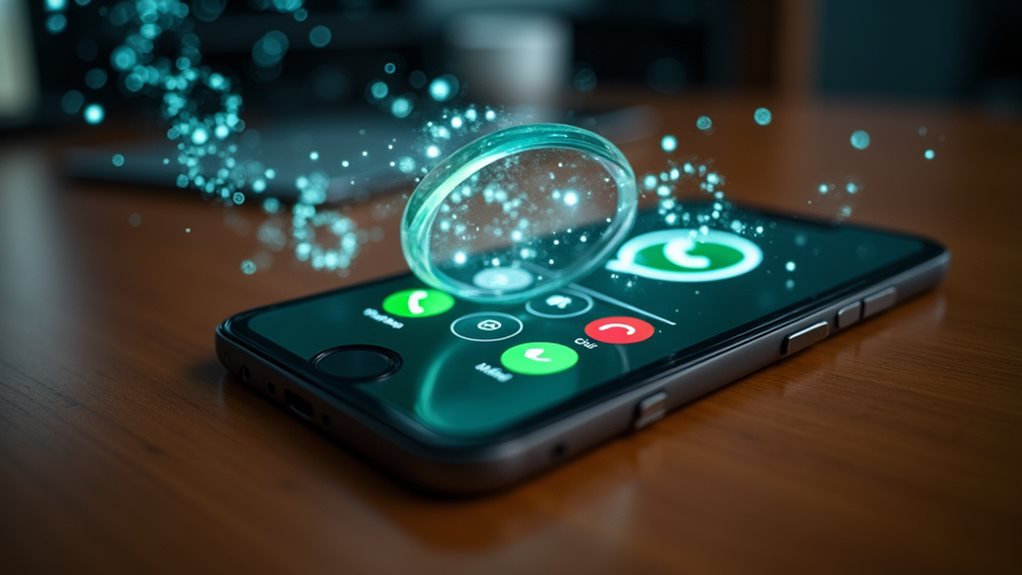
Understanding WhatsApp call metadata reveals a complex system of data collection that goes far beyond simple phone numbers. When you make a WhatsApp call, the app collects detailed information about your communication, including call duration, timestamps, and the relay servers used during your conversation.
These metadata implications might surprise you, as most users aren't aware of how much information is being stored.
The metadata collection process involves multiple components that work together to establish and maintain your calls:
- Your phone interacts with various servers through signaling messages that set up and manage the connection
- STUN sessions help create peer-to-peer connections for voice transmission
- Forensic tools can extract and analyze this metadata from call signaling messages
You should know that while your call content remains encrypted, companies like Meta have access to this extensive metadata. Additionally, the use of VoIP security protocols, such as SIP over TLS, can enhance the protection of call metadata from unauthorized access.
User awareness about these collection practices is essential for making informed decisions about your communication methods. While WhatsApp offers convenient calling features, it's important to understand that each call leaves a detailed digital footprint that includes timestamps, duration, and technical details about how the connection was established.
Legal Methods for Call Tracing
Legal methods for tracing WhatsApp calls include parental monitoring solutions that you'll need to implement before any surveillance begins, though they must comply with your jurisdiction's consent laws.
You'll find that law enforcement agencies can trace WhatsApp calls through proper legal channels, requiring either a court order or subpoena to access call metadata.
When seeking authorized call tracing, you must understand that the process typically starts with law enforcement submitting a formal request to WhatsApp, which then evaluates the legal validity before potentially releasing any available information.
Parental Monitoring Solutions
Several parental monitoring solutions offer legal methods to track children's WhatsApp activity while respecting privacy laws and encryption protocols. With parental consent, you can implement device monitoring through apps like Bark, mSpy, and MMGuardian to keep your children safe in the digital world.
These solutions work by scanning messages and providing real-time alerts for concerning content.
To guarantee effective monitoring of your child's WhatsApp activity, consider these essential features:
- Real-time alerts for potentially harmful content, including cyberbullying and explicit material
- Content filtering capabilities that continuously scan conversations
- Time limit controls to manage screen time and daily usage
You'll find that most parental monitoring apps provide detailed reports on usage patterns while maintaining security through two-factor authentication. Moreover, establishing strong passwords and multi-factor authentication can enhance security measures in monitoring applications.
When selecting a monitoring solution, it's vital to choose reliable apps that receive regular updates to maintain effectiveness.
Remember that these tools don't break WhatsApp's end-to-end encryption; instead, they monitor device activity directly. By implementing these solutions, you're taking proactive steps to protect your children while respecting their privacy and legal boundaries.
Law Enforcement Authorization Process
A rigorous authorization process governs how law enforcement can trace WhatsApp calls. You'll find that agencies must follow strict legal procedures, including obtaining court orders and subpoenas, before they can access any user data. This guarantees that your privacy rights are protected while allowing legitimate investigations to proceed.
When law enforcement needs to trace WhatsApp calls, they're required to submit detailed documentation justifying their data access requests. These requests often involve preservation orders, which require WhatsApp to save specific user data for investigation purposes.
You'll be reassured to know that WhatsApp must comply with local privacy laws and regulations when handling these requests.
The process typically involves international cooperation when calls cross borders, with agencies working together through established data sharing agreements.
You should understand that WhatsApp provides 24/7 emergency assistance to law enforcement while maintaining transparency through regular reports about government data requests.
This balanced approach helps protect both individual privacy rights and public safety interests, guaranteeing that call tracing only occurs when legally justified and properly authorized.
Data Protection and Privacy Features
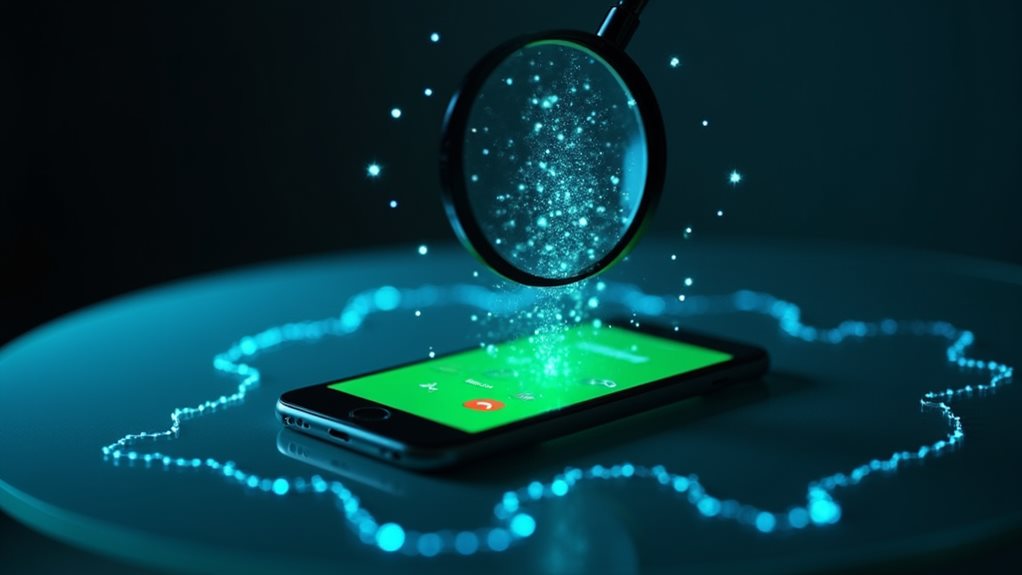
While privacy concerns about messaging apps continue to grow, WhatsApp maintains robust data protection and privacy features to safeguard user communications. As a user, you'll benefit from end-to-end encryption that protects your messages and calls from third-party interception, ensuring complete data ownership and user privacy.
You can customize your privacy settings to control who sees your information through various options:
- Set visibility of your profile photo, status, and "last seen" to Everyone, My Contacts, or Nobody
- Enable two-step verification for enhanced account security
- Activate message auto-deletion after a specified time period
Your communications remain secure through WhatsApp's sophisticated encryption system, which prevents even the platform itself from accessing your message content. Advanced encryption protocols are vital in bolstering the security of your communications.
You're in control of your data, with the ability to manage group privacy settings and restrict unwanted additions to groups. For additional security, you can silence unknown callers and disable live location sharing.
WhatsApp's commitment to protecting your privacy extends to its decentralized storage system, which minimizes the risk of data breaches by avoiding central storage of your conversations.
Parental Monitoring Options
Parents looking to protect their children online can take advantage of various WhatsApp monitoring options. With tools like MMGuardian and MoniMaster, you'll have access to thorough monitoring features that help safeguard your children's digital interactions while maintaining monitoring ethics.
These parental control solutions offer real-time tracking of messages, calls, and media content. You can set up content filtering to block inappropriate material and receive instant alerts when potential dangers arise.
With parental consent properly established, you're able to set reasonable time limits on WhatsApp usage and generate detailed reports about your child's online activities.
For more extensive monitoring, third-party applications like Spapp Monitoring provide additional features such as call recording and location tracking.
You'll need physical access to your child's Android device or iCloud credentials for iOS devices to set up these monitoring tools. The process is straightforward, with user-friendly interfaces that make navigation simple.
Law Enforcement Access Protocols
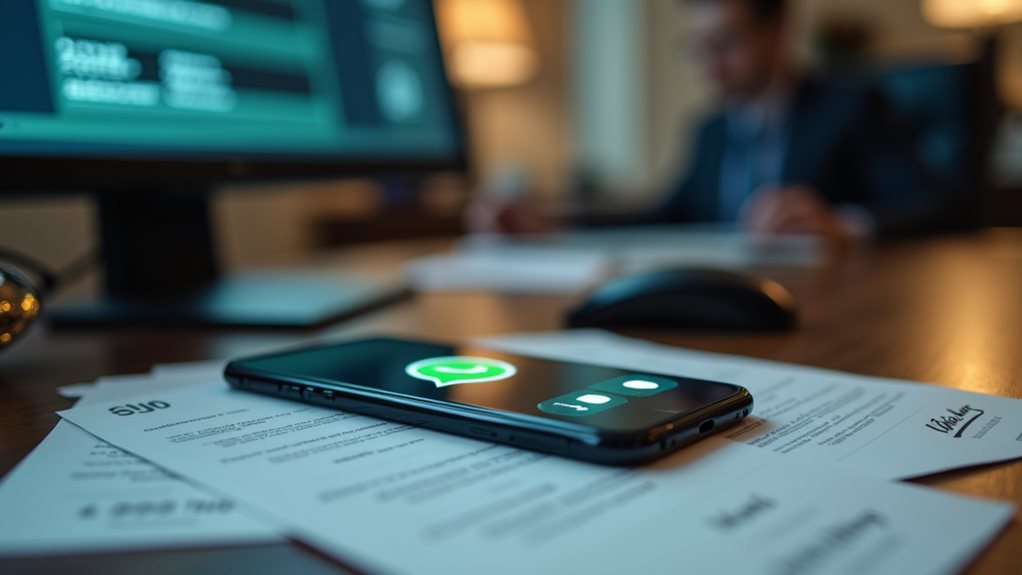
Law enforcement's ability to trace WhatsApp calls requires strict legal procedures, including valid warrants and documented justification for accessing your communication data.
You'll find that agencies often need to work across international borders, coordinating with multiple jurisdictions to gather necessary information, especially when calls involve users from different countries.
While police can access certain WhatsApp data through specialized tools and forensic methods, they're still limited by the platform's encryption and data retention policies, which means they can't always recover complete call records or content. Additionally, the challenges posed by encrypted messaging capabilities can complicate law enforcement efforts to monitor communications effectively.
Legal Request Requirements
According to established protocols, enforcement agencies must follow strict legal requirements to access WhatsApp user data. If you're wondering about the legal standards involved, different types of requests require specific levels of authorization. For basic subscriber information, agencies need a valid subpoena, while stored contents like profile photos require a search warrant.
Here's what you should know about standard request procedures:
- Law enforcement must submit requests through WhatsApp's official online system using a government-issued email address.
- International requests need to comply with Mutual Legal Assistance Treaties and local laws.
- Emergency situations can be expedited through WhatsApp's Law Enforcement Online Request System.
You'll find that the process is quite structured, with agencies needing to provide specific details about their identity and authority. They can't just make broad, vague requests – they need to include precise information like the WhatsApp account number they're investigating.
When it comes to encrypted content, even with proper authorization, you should know that WhatsApp can't provide direct access to message or call contents due to end-to-end encryption.
Global Cooperation Procedures
While local law enforcement follows specific protocols, international investigations require more complex procedures. When authorities need to trace WhatsApp calls across borders, they'll typically work through global treaties and established legal frameworks, such as Mutual Legal Assistance Treaties.
You'll find that these processes guarantee proper oversight and protect your rights while enabling necessary investigations.
Law enforcement agencies worldwide can submit preservation requests through WhatsApp's online system, which keeps your account records for 90 days during criminal investigations.
If you're concerned about privacy, you should know that WhatsApp's end-to-end encryption means they can't access your actual message content, though basic account details like your profile picture remain accessible to authorities with valid warrants.
You're not entirely vulnerable to surveillance, especially if you live in countries with strong privacy laws. Additionally, VoIP technology plays a significant role in how calls can be traced, influencing the methods used by authorities to investigate fraudulent activities.
However, you should be aware that law enforcement can use specialized tools to analyze traffic patterns and trace IP addresses during calls.
If you're privacy-conscious, using a VPN can help protect your connection details from being traced through these methods.
Data Recovery Limitations
Forensic experts face significant hurdles when recovering WhatsApp call data due to the platform's robust encryption system. When you're trying to trace WhatsApp calls, you'll encounter multiple traceability challenges that make data recovery complex and sometimes impossible without proper access to the device.
- End-to-end encryption serves as a primary barrier, making it virtually impossible to intercept call content without physical access to the target device or encryption keys.
- While third-party monitoring tools exist, they must be installed directly on the device, limiting their effectiveness in remote investigations.
- Even with physical device access, encryption weaknesses are rare, and extracting meaningful data requires sophisticated forensic techniques.
You'll find that law enforcement agencies often struggle with these limitations, as they must balance investigative needs with legal constraints and privacy concerns.
The Signal Protocol used by WhatsApp provides forward secrecy, which means that even if you manage to decrypt one communication session, you won't be able to access previous or future sessions.
This makes systematic monitoring particularly challenging, especially when dealing with time-sensitive investigations that require immediate access to call data.
Third-Party Tracking Tools
Various third-party tracking tools have emerged to monitor WhatsApp calls, despite the platform's encryption features. You'll find popular options like Cocospy, uMobix, and Hoverwatch that offer extensive tracking methodologies, allowing you to monitor calls, chats, and even location data.
However, it's important to reflect on the ethical implications before implementing these tools. If you're planning to use these tracking solutions, you'll need physical access to Android devices or iCloud credentials for iPhones. Tools like Salestrail and AirDroid WhatsApp Monitoring can help you track specific numbers, but you'll want to verify you're using them for legitimate purposes like parental control or employee monitoring.
These apps run invisibly in the background, syncing data in real-time. Additionally, the rise of VoIP scams, such as vishing attacks, highlights the importance of being cautious when dealing with sensitive information over calls.
While third-party tools can bypass WhatsApp's end-to-end encryption by accessing the device directly, you'll need to be cautious about security. It's vital to choose reputable tracking tools to avoid malware and potential data breaches.
Remember to implement two-factor authentication and regularly clear unnecessary information from your devices to maintain security.
Real-Time Monitoring Limitations
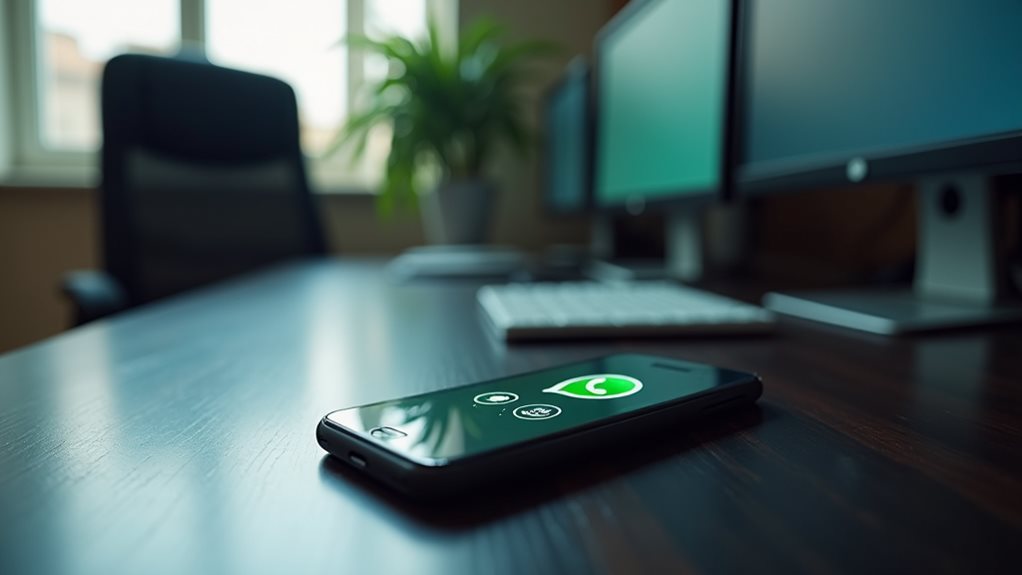
The complexity of real-time monitoring poses significant challenges when tracking WhatsApp calls. You'll find that even with advanced monitoring techniques, WhatsApp's end-to-end encryption creates substantial barriers for tracking attempts.
When you're trying to monitor calls in real time, you're facing a combination of technical hurdles and legal restrictions that make the process extremely difficult.
Ponder these key real time challenges you'll encounter:
- WhatsApp's encryption protocols actively prevent unauthorized access to call data
- Dynamic IP addresses and network routing complexities make tracking nearly impossible
- System resources can become overwhelmed when attempting large-scale monitoring
You're also dealing with significant practical limitations that affect your ability to monitor effectively.
The platform's regular security updates mean that any monitoring approach you might contemplate could become obsolete quickly. Plus, you'll need to weigh the legal implications, as real-time monitoring often conflicts with privacy laws and consent requirements.
If you're part of a regulated industry like finance or trading, you'll need to be particularly careful about compliance issues while attempting any form of call monitoring.
WhatsApp Server Relay System
Understanding WhatsApp's server relay system adds another layer to why call tracing becomes complex. When you make a WhatsApp call, you're actually connecting through a sophisticated network of relay containers spread across thousands of locations worldwide. This relay system isn't just passing your call through a single point – it's constantly working to optimize your connection.
Your call data travels through multiple Points of Presence (PoPs), where hundreds of containers work together to maintain your connection quality. What's particularly interesting is that even participants in the same call might be served by different containers, making traditional call tracing methods less effective.
The system's call optimization features are continuously at work, selecting the best possible cluster for your conversation based on real-time conditions. The relay system employs sophisticated targeting algorithms that analyze historical latency data to provide you with the best possible connection.
It's also smart enough to adjust on the fly, moving your call to different clusters if network conditions change. This distributed approach to handling media packets, combined with centralized decision-making for each call, creates a robust system that prioritizes both performance and privacy.
Frequently Asked Questions
Can Whatsapp Calls Be Recorded by the Person I'm Talking To?
Yes, the person you're talking to can record your WhatsApp call using various methods like call recording apps or a second device, but they should inform you first due to privacy concerns and legal requirements.
Do Whatsapp Video Calls Use More Data Than Regular Voice Calls?
Yes, your WhatsApp video calls consume considerably more data than voice calls. In a data consumption comparison, video calls use about 2.5MB per minute, while voice calls only use around 400KB per minute.
Can Blocked Contacts Still Trace My Whatsapp Calls?
You're safe from blocked contact tracing as they can't monitor your WhatsApp calls. Your call privacy concerns are protected since blocking someone removes their ability to access your communications entirely.
Does Using VPN Affect Whatsapp Call Quality or Traceability?
Your VPN performance can affect call quality – slower speeds may cause lag. However, you'll get extra privacy since VPNs add another layer of call encryption to WhatsApp's existing protection.
Can Whatsapp Calls Be Traced After Deleting the App or Account?
Yes, your WhatsApp calls can be traced even after deletion due to data retention policies. Your call records remain in backups and server logs, raising privacy concerns. You'll want to contemplate this when using the app.
Final Thoughts
You'll find that while WhatsApp calls are generally secure through end-to-end encryption, they're not entirely untraceable. Your call metadata, including timestamps and participant information, can be accessed through legal channels. To maintain your privacy, it's essential to understand these limitations and use additional security measures when needed. Remember that while WhatsApp offers robust protection, no digital communication is completely immune to authorized surveillance.

